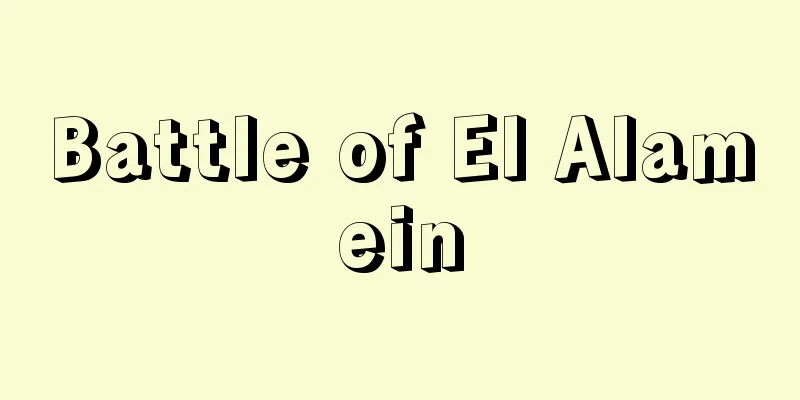Idealism - Kannenron (English spelling) idealism English

|
A position that regards ideas or the ideal as having priority over real or material things, whether theoretically or practically, is called idealism, and is used as a term opposed to realism or materialism. [Megumi Sakabe] The establishment of the terminology law and its backgroundThe word idealist is said to have been first used in a letter by Leibniz at the end of the 17th century, where it was introduced as an adjective to Plato in contrast to Epicurus, a materialist. In other words, Plato's position, which considered ideas or forms to be true reality and the essential definition of things, was considered idealistic, in contrast to Epicurus, who considered matter to be real. However, since the Middle Ages, such a Platonist position has generally been called realism in contrast to nominalism, or characterized as formism, and the term idealism can be seen as having been introduced, at least implicitly, in accordance with the change in the problematic situation of the times due to the emergence of a new anthropocentric epistemology in early modern philosophy, from the nominalism of the late Middle Ages, which considered ideas to be conscious contents or representations. In fact, from this point on, the term idealism is always used as a guide to whether or not to accept the existence of an external or material world that is distinct from the ideas in the human mind. [Megumi Sakabe] Subjective idealismAs summarized in the famous proposition "to be is to be perceived," Berkeley's position, which denied the existence of the external or material world and reduced all human cognitive functions to ideas in the mind, was often considered to represent idealism in the 18th century and was often subject to various criticisms. Berkeley's position can be categorized as subjective idealism, particularly in terms of the above-mentioned claims. However, he also had a motif of thought that was common to Malebranche, namely the presence of ideas not only in the subjectivity of individual human beings but also in the mind of the universal God, and in this respect it would be more appropriate to consider it as a combination of elements directly connected to the orthodoxy of Platonism. Rather, the later philosophy of Schopenhauer, which considered the entire world to be nothing but a representation created by the "dark will to life," is in a sense more worthy of the name of subjective idealism. [Megumi Sakabe] Transcendental and critical idealismKant marked a period in the development of modern idealism by proposing the position of transcendental idealism, which regards nature, the external or material world, as a "phenomenon" that is constructed according to the various forms of a priori (innate) cognition of the human cognitive subject, such as space, time, and concepts of pure understanding (categories), and to that extent has objective validity. This was made with the intention of saving the universality of mathematical natural science as a rigorous science in the modern era, while critically limiting the scope of the validity of its cognition, and it is distinct from Berkeley's idealism, which assumes "things in themselves" behind "phenomenon" or states that "transcendental idealism is nothing other than empirical realism." [Megumi Sakabe] Ethical idealism, aesthetic idealism, absolute idealismFichte's position, which criticized Kant's idea of "things in themselves" and instead elevated the human being as a practical and autonomous subject that he advocated to the "ego" as the fundamental principle of the development of the universe itself, is characterized as ethical idealism because it values the spontaneity, autonomy, and freedom of the subject. Similarly, Schelling's position, which abandoned Kant's finitism and saw the ultimate development of the natural world in aesthetic creation and aesthetic intuition, is worthy of the name of aesthetic idealism. Furthermore, Hegel's position, which regards the development of the world, including the natural and historical, as the dialectical self-development of ideas or absolute spirit, is sometimes called absolute idealism. In the philosophy of "German idealism" developed by these three philosophers, the meaning of "idea" as a prototype or norm since Plato is strongly brought to the surface, and idealism is often translated as idealism here. [Megumi Sakabe] Criticism of Idealism and its MeaningSince the early modern period, idealism has always been in opposition to materialism, which is linked to the development of positive science. The main trends in criticism of idealism were positivist and scientistic materialism in the 19th century and Marxist dialectical materialism. It is true that idealism, when taken to an extreme, tends to play a reactionary role at various levels, distorting knowledge of reality or deliberately closing one's eyes to it. However, since humans are animals that are free and spontaneous and open to the future, it is impossible for them to live without some form of connection with idealism. [Megumi Sakabe] "Plato: The Intellectual Heritage of Mankind 7" by Shinzui Saito (1982, Kodansha) " "The Theory of Human Knowledge" by Berkeley, translated by Haruhiko Otsuki (Iwanami Bunko)" "Critique of Pure Reason" by Kant, translated by Hideo Shinoda (Iwanami Bunko)" [References] |Source: Shogakukan Encyclopedia Nipponica About Encyclopedia Nipponica Information | Legend |
|
理論的にせよ実践的にせよ、観念あるいは観念的なものを実在的あるいは物質的なものに優先するとみなす立場を観念論といい、実在論あるいは唯物論に対立する用語として使われる。 [坂部 恵] 用語法の成立とその背景観念論者idealistの語が最初に用いられたのは、17世紀末のライプニッツの一書簡においてであるといわれるが、ここでは、この語は、唯物論者であるエピクロスに対してプラトンを形容する語として導入されている。すなわち、物質を実在とするエピクロスに対して、イデアないし形相を真の実在とし、事物の本質規定とみなすプラトンの立場が観念論的なものとみなされたのである。しかし、中世このかた、こうしたプラトン主義の立場は、唯名論との対比において実在論とよばれたり、あるいは形相論として特徴づけられるのが一般であり、観念論の用語は、むしろ、観念を意識内容ないし表象とみなす中世末期の唯名論から、近世哲学での新たな人間中心的認識論の登場による時代の問題状況の変化に伴って、その影響を少なくとも暗に受けつつ、導入されてきたとみることができるであろう。事実、これ以後、観念論の用語は、人間の心の内の観念と区別された外界あるいは物質的世界の実在を認めるか認めないかをつねに一つのめどとして使われるようになるのである。 [坂部 恵] 主観的観念論有名な「存在するとは知覚されること」という命題に集約されるように、外界ないし物質的世界の実在を否定して、人間のすべての認識の働きを心の内の観念に還元したバークリーの立場が、18世紀においては、しばしば、観念論を代表するものとみなされ、少なからぬ場合、さまざまな批判の対象ともなった。バークリーの立場は、前記のような主張をとりわけて取り出していえば、主観的観念論としていちおう類型化することができる。しかし彼は、一方で、人間個々人の主観のみならず、普遍的な神の心への観念の現前というマルブランシュにも通じる思考のモチーフをもあわせもっていたのであり、この点では、むしろプラトン主義の正統に直結する要素をあわせ考えるのが妥当であろう。むしろ、世界のすべてを「生への暗い意志」の生み出す表象にほかならぬとした、後のショーペンハウアーの哲学のほうが、ある意味では主観的観念論の名にふさわしい。 [坂部 恵] 超越論的・批判的観念論カントは、外界ないし物質的世界としての自然を、空間・時間、純粋悟性概念(カテゴリー)など、人間の認識主観のア・プリオリ(先天的)な認識の諸形式に従って構成され、その限りでは客観的妥当性をもつ「現象」とみなす超越論的観念論の立場を打ち出して、近世観念論の展開に一時期を画した。これは、近世の厳密学としての数学的自然科学の普遍性を救いつつ、その認識の有効性の範囲を批判的に限定する意図から出たものであり、「現象」の背後に「物自体」を想定し、あるいは「超越論的観念論は経験的実在論にほかならない」とするなど、バークリーの観念論とは一線を画するものである。 [坂部 恵] 倫理的観念論、美的観念論、絶対的観念論カントの「物自体」の考えを批判し、むしろ彼の唱道した実践的・自律的主体としての人間を宇宙そのものの展開の根本原理としての「自我」にまで高めたフィヒテの立場は、主体の自発性、自律、自由を重んずるゆえに倫理的観念論として特徴づけられる。また、同じく、カントの有限主義を捨てて、美的創造や美的直観に自然世界の展開の究極をみたシェリングの立場は、美的観念論の名にふさわしい。さらに、自然的、歴史的を含めた世界の展開を観念あるいは絶対的精神の弁証法的自己展開とみなすヘーゲルの立場は、ときに絶対的観念論の名でよばれる。以上3人の哲学者によって展開された「ドイツ観念論」の哲学においては、「観念」のもつプラトン以来の原型ないし規範の意味がいずれも強く表面に出されており、観念論は、ここでは理想主義の訳語をあてられることがまれではない。 [坂部 恵] 観念論への批判とその意味近世以降の観念論は、つねに実証科学の展開と結び付いた唯物論と対抗関係に置かれてきた。19世紀の実証主義的・科学主義的唯物論、マルクス主義の弁証法的唯物論などが観念論批判の主要な潮流であった。確かに、観念論はそれが極端に走りすぎた場合、ともすれば現実についての知識を歪曲(わいきょく)し、あるいはそれに対して故意に目を閉ざすといった反動的役回りをさまざまなレベルで演じる傾向をもっている。とはいえ、人間が自由と自発性をもって未来に向かって開かれた動物である以上、なんらかの形での観念論的なものとのかかわりなしには生きることはありえないであろう。 [坂部 恵] 『斎藤忍随著『人類の知的遺産7 プラトン』(1982・講談社)』▽『バークリー著、大槻春彦訳『人知原理論』(岩波文庫)』▽『カント著、篠田英雄訳『純粋理性批判』(岩波文庫)』 [参照項目] |出典 小学館 日本大百科全書(ニッポニカ)日本大百科全書(ニッポニカ)について 情報 | 凡例 |
Recommend
Yoshikawa [town] - Yoshikawa
A former town in Nakakubiki County, southwest of N...
Cold spot
〘noun〙 A sensory point on the skin that produces a...
Lightness - Made
A color attribute, which indicates the brightness...
Condylura
…Many species have orange spots on the underside....
Lake Teganuma
This lake is located on the right bank of the dow...
Pacific Ocean
A new religion that arose in China at the end of ...
《First Calligraphy of the Sea》
…He was 54 years old at the time. During the next...
Han Chin Shu - Kanchinsho
...The book is divided into 17 sections, includin...
Tyumen - Tyumen (English spelling) Тюмень/Tyumen'
The capital of Tyumen Oblast in central Russia. I...
Oliver!
...In this novel, the author expresses his bitter...
Virgilius
…Also called Virgil. From the 5th century onwards...
Toshimasa Oda
…Around 1575 (the 7th year of Bunmei), Shiba Yosh...
Noboseito
During the Edo period, raw silk was sent from vari...
National government office
The location of the provincial government office (...
Mycotoxins
This refers to a mycotoxin. It is a toxic substanc...

![Osafune [town] - Osafune](/upload/images/67cb1cced2b78.webp)







